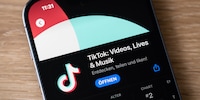
Background information
Apple iOS 14.5: online privacy, please
by Dominik Bärlocher

Facebook is now Meta. The actual social network is still called Facebook, but its parent company has a new name. With this name comes a new direction. As well as a whole lot of marketing.
The Facebook group is now called Meta. Mark Zuckerberg’s creation thus kills several birds with one stone. Not only does Meta free all its non-social-media projects from the name «Facebook», it’s also a fresh start. In a way.
The group is also looking to clear up some things, as the terms surrounding them are currently quite confusing.
Until now, Facebook’s corporate structure, greatly simplified, looked like this:
With the change to Meta, here’s how it’ll look now:
All the subsidiaries will remain as they are today. Facebook, the social network, is still called Facebook, but will now be a subsidiary of the Meta Group. To date, the Facebook network was a subsidiary of the Facebook group.
First and foremost, nothing will change for users. Mark Zuckerberg is now the CEO and chairman of Meta, the app on your phone is still called Facebook. But the tech world has transformed.
Meta’s end goal is hidden in its name: a metaverse. The next big frontier in the technology sector. It’s an innovation many companies are working on, so far unsuccessfully.
The complicated system involves Non-Fungible Tokens (NFT), the blockchain, technologies that are still non-existent, and a worldview that we as ordinary citizens cannot comprehend in all its complexity. However, you might just know the end result. The book and the movie «Ready Player One» showed us a purely virtual world where anything is possible.
In the movie, the metaverse is called «Oasis», and it contains pretty much everything. Whereas the movie emphasises treasure hunting and gaming, the book mentions and explains other functions of the Oasis. Even schools are completely online, with better visualisations than Microsoft Teams or its competitors could even dream of. Friendships that span continents aren’t just onscreen chats, but can have tactile elements.
Mark Zuckerberg’s goal is to create the Metaverse as a place where a new economy and new goods can emerge. With the Meta Group on top as the puppet master, naturally.
In the context of recent negative headlines surrounding Facebook, which apparently had nothing to do with the name change according to Zuckerberg, it all sounds quite horrifying. Meta as the dominant force on the Internet, controlling our economy and commerce. But Meta isn’t the only company looking to conquer the Metaverse. Epic wants to rearrange Fortnite into one, Microsoft Mesh is going in the same direction. In South Korea, work is being done on a metaverse, and Decentraland is trying to do it all without a large-scale operation or a single entity in the background.
In short, the metaverse is coming – in some form. Will it be as gloriously beautiful and versatile as the Oasis? Probably not. There’ll probably still be enough interesting activities in the real world to make us not want to hang out in the metaverse 24 hours a day.
Hopefully.
In addition to hoping for future Internet domination, Facebook’s renaming to Meta already has its benefits. Say farewell to «WhatsApp by Facebook», its «WhatsApp by Meta» now. They’d rather you forget about Mark Zuckerberg’s data empire every time you launch an app. It’s a brand-new ecosystem that will one day become the Metaverse.
A name alone can help a lot in seeing an app as malicious or not. And whereas Facebook is seen as evil, Meta could become appealing if the group’s marketing department spins it right.
Oculus is first up on the rebranding hitlist. These VR headsets were previously called «Oculus Quest», but will soon be sold under the name «Meta Quest». With this renaming, users and developers will also no longer be required to log in with a personal Facebook account.
[…] we’re working on making it so you can log into Quest with an account other than your personal Facebook account. We’re starting to test support for Work Accounts soon, and we’re working on making a broader shift here within the next year.
As good as that may sound, data collection will continue. In the same article, Mark Zuckerberg addresses the movement of a user in the metaverse, where all experiences come together. So basically, it appears your other, external profiles will be attached to your Facebook account. Then, depending on which one logs in, a different user profile will be called up. Nevertheless, it will be subordinate to your umbrella account.
What users would like is for logins as well as data collection and correlation at Meta Quest to work independently from Facebook. Each so-called OAuth provider is classified as independent.
However, here’s what’s way more likely to happen:
With this login architecture, Facebook doesn’t just retain its position of power, it also immediately expands its data collection to other accounts.
Google had the same problem a few years ago. Both the advertising company and search engine were called «Google». As well as their parent company. Then that part became «Alphabet». The brand’s official website, still contains nothing more than a few marketing slogans from Google founder Larry Page. Alphabet is never mentioned in public discourse; at most, it’s brought up when reporting quarterly figures. But always as «The company that owns Google».
So it’s quite possible that this is the last we’ll ever hear of Meta.
Because just like Alphabet, Meta as a company doesn’t have an operational goal. It’s a holding company housing many smaller ones, which only might bear the same name. Meta Quest is a good example. However, Instagram probably won’t become Metagram. Just as Facebook won’t morph into Metabook. WhatsApp also won’t turn into MetaApp. Probably.
Meta will be working behind the scenes. Bringing together all the threads, a place where shareholders draw money from, and where the future is set in stone. Meta is the place where developments are implemented strategically rather than operationally. Remaining undisturbed the whole time, quietly raking in heaps of cash.
Meta is probably also ahead of its time. Just like Google Glass back in 2013. Meta wants to be seen as a «Social Technology Company», not a social media nightmare. Google wanted to revolutionise the world with its smart glasses. How? Why? No one knows for sure. Until now. The smart glasses had potential, but were hardly well received. Today, Glass is still around, but how many people do you see walking around with a prism in front of their right eye?

Facebook, the company, had or has portal, a smart speaker with a screen. And Meta has gobbled up a host of other companies as well. There’s Giphy, there’s the «tbh» app, the file-sharing service Drop.io and a variety of other projects. Just like Google, which has initiated a large number of projects and then buried them again.
All these projects should’ve yielded significant profits. But they didn’t. Giphy may be profitable, but Facebook makes the big bucks just like Google does: advertising.
Both companies want to move away from it, as Meta is already suffering from Apple’s latest advertising restrictions. This is going to get worse, Google also wants to eliminate third-party cookies and prevent tracking. Something Meta and Google have made money on. However, Google at least has an alternative which the world cannot escape so easily. Federated Learning of Cohorts (FLoC) does much the same thing as cookies, but centralises information sovereignty with Google.
The loser here would be Meta. Back when it was still a young Facebook, it imposed itself on the Internet. Back when social media didn’t really exist as a word. Now that the world is saturated with data giants, the company is realising this redundancy. We don’t use Facebook like Wikipedia. Or even Google. Facebook, Instagram, WhatsApp, Portal and all that stuff are actually superfluous.
So if Meta wants to create their Metaverse, then the corporation has to somehow make money that isn’t from advertising. Simultaneously, they need to find a business sector in which the group is accepted and which generates enough money to satisfy shareholders and finance further development.
Neither Alphabet nor Meta has managed to do that yet. Google’s numbers are quite clear: over 80 per cent of Alphabet’s revenue comes from Google, which makes its money from advertising. Facebook wasn’t much different back in 2020.
With its rebranding to Meta and a newly publicised goal towards becoming the dominant Internet force, Facebook has set itself a Herculean task.
And the group has taken a risk.
Meta must extricate itself from collapsing advertising revenues in the short term. Only this way do they stand a chance of dominating the Internet in the long term. But even if Meta can break out of the golden cage of advertising revenue, users are still standing in the way of this new old company. Sure, at the keynote, Project Cambria – Meta’s new VR goggles – looked good, but in reality, you’ll still have heavy goggles on your face. Is that what people want? Or will Meta’s metaverse face the same fate as Google Glass?
Only time will tell. But until then, it’s up to users and groups such as the Electronic Frontier Foundation to keep mentioning how the whole thing sounds pretty neat, while pushing for the removal of data giants and sinister background umbrella corporations. Meta’s biggest task probably does lie in convincing users that they aren’t evil. After all, Facebook practically invented the concept. They’ve made their bed. Now Meta needs to lay in it.
There you have it. On a final note, Mark Zuckerberg joked that he «should actually be the robot» during a meeting in the Metaverse with a similarly dressed user. Looks like someone updated Zucc’s humour algorithms.
Journalist. Author. Hacker. A storyteller searching for boundaries, secrets and taboos – putting the world to paper. Not because I can but because I can’t not.
Interesting facts about products, behind-the-scenes looks at manufacturers and deep-dives on interesting people.
Show all
Background information
by Dominik Bärlocher

Background information
by Samuel Buchmann

Background information
by Samuel Buchmann